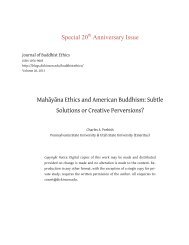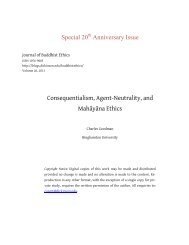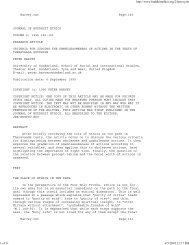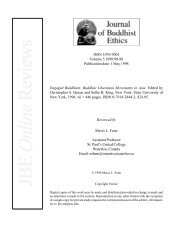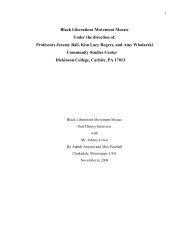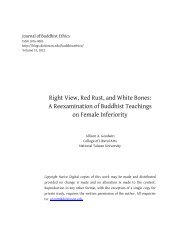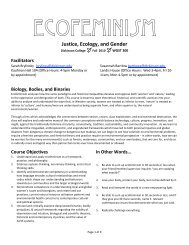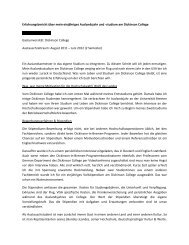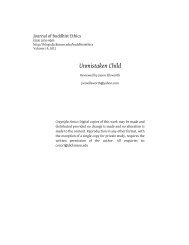Read article - Dickinson Blogs
Read article - Dickinson Blogs
Read article - Dickinson Blogs
Create successful ePaper yourself
Turn your PDF publications into a flip-book with our unique Google optimized e-Paper software.
Barstow, Between Abstinence and Indulgence 88<br />
In this passage, one of his longest discourses on eating meat, Jigmé<br />
Lingpa bases his argument against meat on the idea that all beings have<br />
been one’s parent and one’s friend. Those who eat the meat of slaughtered<br />
animals, therefore, are repaying the kindness of their parents with vio-<br />
lence.<br />
In this passage Jigmé Lingpa also uses strikingly vivid language to<br />
describe the suffering animals undergo while awaiting slaughter, claiming<br />
they “all tremble with fear in these butchers's hands, panting for breath<br />
with tears streaming from their eyes” (Autobiography 126). 22 Clearly,<br />
Jigmé Lingpa had a keen awareness of animal suffering. By using such<br />
vivid descriptions, Jigmé Lingpa tried to pass that awareness on to his<br />
readers. Further, this description of animal suffering makes clear that<br />
Jigmé Lingpa believed animals to have feelings and an awareness of their<br />
fate, and that these combine to produce an intense fear.<br />
The critique of meat presented here hinges on the relationship be-<br />
tween eating meat and killing animals. Many Tibetans who eat meat argue<br />
that this is entirely divorced from the act of killing. In this argument, a<br />
butcher who kills an animal is solely responsible for the death of the ani-<br />
mal; the person who buys the meat does so after the death has already occurred,<br />
and bears no culpability, karmic or otherwise. 23<br />
Given Jigmé Lingpa’s concern for animals, it should not be sur-<br />
prising that he disagrees with this logic. We can see this implicitly in the<br />
22 ma rgan de dag lus 'dar phri li li/ mig mchi ma khram khram/ dbugs spud pa lhed lhed pa'i<br />
ngang nas 'di snyam du/<br />
23 I have yet to find any Tibetan texts that actually promote this idea, though it was<br />
widely mentioned by contemporary informants in Tibet, India and Nepal. Further, it<br />
has been repeatedly critiqued by many authors supportive of vegetarianism, including<br />
Dolpopa, Shabkar and Patrül Rinpoché in addition to Jigmé Lingpa. It seems likely,<br />
therefore, that the idea that eating meat is wholly separate from the killing of the ani-<br />
mal has been current at many points in Tibetan history.



